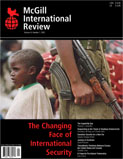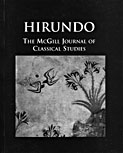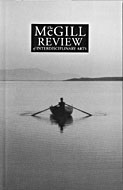Student journals: Publish and prosper
Student journals: Publish and prosper McGill University
User Tools (skip):
Student journals: publish and prosper
The pressure in academia to publish research articles has contributed to the emergence of several new undergraduate Arts journals, giving students a chance to showcase their best work in peer-reviewed publications, while bolstering their curriculum vitae as they complete their bachelor's degree.

Unlike their counterparts in other faculties, BA candidates are fairly limited in venues when it comes to publishing. Most opportunities are reserved for graduate students and professors, leaving undergraduates with few options to revisit their work once they have submitted it for grading. "Oftentimes, once students get their marked papers returned from their professors they don't look at them ever again. Journal publication gives them a venue to rework and craft their ideas and validate all the work they put into papers," says English major Michelle MacArthur, editor-in-chief of Intersexions, a new interdisciplinary journal focusing on gender issues. "They are really one of the only forums for undergraduate students to be heard and have their work published, recognized and validated. It is also a great opportunity for students to revise their work and pursue topics in more depth."
Students like MacArthur are spearheading journals of their own across various departments in the Faculty of Arts, which counts between 10 and 15 undergraduate journals, depending on the academic year and the department's student association. Some, like English and philosophy, even publish two or more titles, obtaining most of their funding from their departments, the Office of the Dean of Arts, Arts Undergraduate Society, Student Society of McGill University as well as other organizations.

By all accounts, the selection process is involved and discriminating. An editorial board advertises a call for papers several months before a journal's publication date, at which point submissions are scrutinized and read blind, with names of contributors removed to ensure papers are evaluated fairly and free of bias. Pieces are usually read multiple times by different members of the committee, and sometimes assigned a numerical grade. High-scoring papers tend to demonstrate good writing, solid research and originality, though most undergraduate journals — unlike professional or graduate publications — do not require pieces that are wholly unique. In the end, papers that most exhibit these qualities are published in the department's undergraduate publication.
Although most editorial boards are entirely student run, some work loosely with faculty members to address issues of academic integrity and merit, though faculty involvement is not deemed to be an integral part of the selection process. Political Science student Eugene Sokoloff, editor-in-chief of the McGill Journal for Political Science, appreciates the independence, autonomy and responsibility. "Professors shouldn't need to get involved in the process. If they interfered, the journals wouldn't be for undergrads, by undergrads."

Other editors agree. While the decision of what gets published rests solely on students, they feel comfortable selecting pieces, notwithstanding their nascent academic backgrounds. "Most of us [on the editorial board] are upper-year students who are familiar with insightful and credible writing because we've read it before. By fourth year, you are a good judge of what is good writing and what isn't," says History and poly sci student Justin Fraterman, editor-in-chief of an international affairs publication, McGill International Review.
At Historical Discourses, a publication by undergraduate history students, the story is similar. History student Seth Offenbach, who was editor-in-chief of the journal last year, and Arts Undergraduate Society president this year, says that most submissions are from honours students, or students in seminar classes. "These papers reflect good quality undergraduate writing. And McGill students are supposed to be some of the finest students in the world."

Still, journal editors experience no illusions of grandeur. Most admit that their goal is not to compete with graduate publications, or journals published by professional organizations. They say they simply want to publish the best undergraduate pieces from writers who can use the experience as a professional or academic stepping stone. "There is some value to these journals — a value for undergraduates to see how certain topics have been handled by their peers. They provide a good introduction, but ultimately you want to go to more professional journals," says Fraterman.
For some, like political science chair Mark Brawley, the professional and academic leverage from having published in an undergraduate journal is limited. "Undergrad journals do not have as wide a readership, are generally unknown to people serving on search committees elsewhere — and thus of unknown quality — and therefore not likely to help grad students on the market very much," he says. Brawley admits, however, that there is an increasing pressure to publish sooner now than ever before. "In fields where the competition is fiercer because of the number of PhDs on the market, you must do everything to show you are above the other candidates. Everyone wants lines on their c.v.!"
Utilitarian considerations aside, journal editors admit that they are also motivated by other factors. Sokoloff says he hopes his journal will increase the exposure of writers, but bring together students that are highly motivated and most interested in talking about political science, as well. And for MacArthur, the rewards — or at least some of them — are similarly intangible. "There is an enormous sense of pride in going through the editing process, improving your writing, sharing your work with your peers and finally seeing your work in print."
